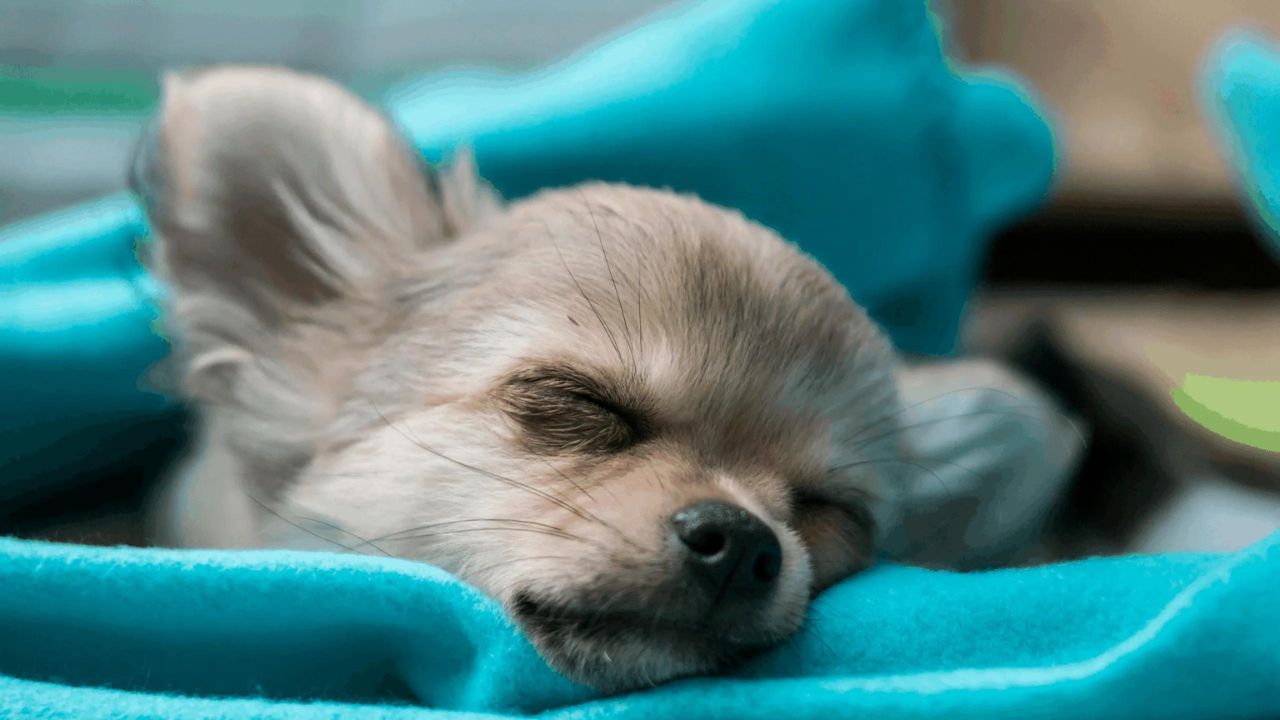Welcoming a new puppy into your home is an exciting and joyous occasion. However, the initial days and nights can be challenging for both the puppy and the owner. In this guide, we’ll explore the fascinating journey of a puppy sleep through the night, offering insights and practical tips on when and how a puppy can sleep through the night.
Newborn Puppy Sleep Patterns

The sleep patterns of newborn puppies are crucial for navigating the first few weeks. Like human infants, puppy sleep through the night for most of the day, but their sleep is divided into short cycles. This can be perplexing for new puppy owners, but rest assured, as we’ll delve into effective strategies to manage this phase.
Newborn puppies, like human infants, spend a significant amount of time sleeping, as it is crucial for their growth and development. Here are some key points about newborn puppy sleep patterns:
Amount of Sleep
- Newborn puppies sleep a lot, typically around 90% of the day during their first few weeks of life.
- They need plenty of rest to support their rapid physical and mental development.
Sleep Cycles
- Puppies, like adult dogs, go through different sleep cycles, including REM (rapid eye movement) sleep.
- REM sleep is essential for brain development and is characterized by more intense dreaming.
Wakefulness for Feeding
- Newborn puppies wake up frequently for short periods to nurse their mother.
- They have small stomachs and need to eat every few hours, so short wakeful periods are interspersed with longer sleep periods.
Lack of Deep Sleep
- Puppies do not experience deep sleep in the same way adult dogs do during the first few weeks of life.
- Their sleep is more fragmented, and they may wake up easily in response to stimuli.
Comfort and Security
- Puppies feel most secure when they are close to their mother and littermates.
- The warmth and comfort of the nest or whelping box contribute to a sense of security, promoting better sleep.
Developmental Changes
- As puppies grow and their nervous systems develop, their sleep patterns gradually change.
- They start to spend more time awake and become more active as they explore their surroundings.
Establishing a Routine
- While it’s essential to let newborn puppies sleep as much as they need, establishing a routine for feeding, cleaning, and short playtime can help regulate their sleep patterns.
Monitoring for Issues
- Keep a close eye on newborn puppies to ensure they are gaining weight and developing properly.
- If a puppy seems excessively sluggish or fails to wake for feedings, it may be a sign of an issue that requires veterinary attention.
Transition to a Regular Schedule
As your puppy grows, transitioning to a more regular puppy sleep through the night schedule becomes essential. We’ll discuss the significance of consistency in routine, offering practical advice on establishing a reliable and comforting bedtime routine for your furry friend.
Certainly! If you’re looking to transition to a regular schedule, here are some tips to help you make the shift smoothly:
Set a Consistent Wake-Up Time
Please choose a time to wake up each day and stick to it, even on weekends. Consistency helps regulate your body’s internal clock.
Establish a Bedtime Routine
Establish a soothing evening ritual to let your body know when it’s time to relax. Reading, having a warm bath, or doing relaxation techniques are a few examples of such hobbies.
Limit Exposure to Screens Before Bed
Minimize screen time (computers, tablets, and phones) at least one hour before going to bed. Screen blue light can disrupt the body’s ability to produce the hormone that promotes sleep.
Create a Comfortable Sleep Environment
Make sure you have a sleeping-friendly bedroom. This entails having a cozy mattress and pillows in addition to a quiet, dark, and cold atmosphere.
Regularize Meal Times
Try to eat meals at roughly the same times each day. Consistent meal times can help regulate your body’s internal clock and improve digestion.
Incorporate Regular Exercise
Make regular exercise a part of your regimen, but steer clear of strenuous activity right before bed. Better sleep can be facilitated by exercise, but timing is important.
Plan Your Day
Organize your daily activities and prioritize tasks. Having a clear plan can reduce stress and help you feel more in control of your time.
Limit Caffeine and Nicotine Intake
Limit your intake of stimulants like nicotine and coffee, especially in the hours before bed.
Stay Hydrated
Make sure you get enough water throughout the day but try to cut back on your intake right before bed to prevent waking up in the middle of the night to use the restroom.
Be Patient and Persistent
It takes time for your body to adjust to a new schedule. Be patient and persistent, and give yourself a few weeks to adapt fully.
Factors Influencing Puppy Sleep
Various factors can influence a puppy’s sleep, ranging from environmental conditions to individual needs. We’ll explore these factors and provide insights into tailoring your approach to meet your puppy’s unique requirements.
Crate Training for Better Sleep
Crate training is a valuable tool for promoting better sleep habits in puppies. We’ll guide you through the process, emphasizing the positive impact of crate training on a puppy’s sense of security and comfort. Crate training can be an effective tool for improving sleep, both for puppies and adult dogs. Here are some tips on how to use crate training to promote better sleep:
Choose the Right Crate
Choose a crate that is the right size for your dog. It should be big enough for the dog to stand up, turn around, and lie down comfortably, but not so big that they can make their own sleeping space.
Create a Positive Association
Make the crate a positive and comfortable space. Place soft bedding, toys, and maybe even an item of your clothing inside to make it cozy and familiar.
Gradual Introduction
Introduce the crate gradually. Start by allowing your dog to explore it with the door open, and reward them for going inside voluntarily. Gradually increase the amount of time they spend inside.
Feeding in the Crate
Feeding your dog in the crate will help him associate it with happy events. This aids in creating a good association between the box and anything enjoyable.
Bedtime Routine
Incorporate the crate into your dog’s bedtime routine. Please encourage them to go into the crate before sleep and provide a special treat or toy as a reward.
Ignore Whining
If your dog whines or barks in the crate, try to ignore it, especially during the night. Responding to whining may reinforce the behavior. Please wait for a moment of quiet before letting them out.
Consistency is Key
Be consistent with crate use. Use it for naps, bedtime, and when you need to leave the house. Consistency helps your dog understand that the crate is a safe and routine part of their environment.
Exercise and Potty Breaks
Ensure your dog gets enough exercise and has had a bathroom break before being crated for the night. A tired and empty dog is more likely to settle down for sleep.
Patience and Positive Reinforcement
Patience is essential. Never use the kennel to penalize your dog, and always reinforce positive behavior with praise and treats.
Consult with a Professional
If you encounter persistent issues with crate training, consider consulting with a professional dog trainer or behaviorist for personalized advice.
Bedtime Routine for Puppies
Creating a suitable bedtime routine is key to a good night’s sleep for your puppy. From winding down activities to creating a calm environment, we’ll outline the elements of an effective bedtime routine.
Addressing Sleep Disturbances
It’s common for puppies to experience sleep disturbances. We’ll identify common issues and provide practical solutions, ensuring both you and your puppy can enjoy uninterrupted nights.
Patience and Consistency in Training
Patience and consistency are the cornerstones of successful sleep training. We’ll share stories of triumphs and challenges, highlighting the importance of a steadfast approach.
Dietary Considerations for Better Sleep
Did you know that a puppy’s diet can impact their sleep patterns? We’ll explore the connection between nutrition and sleep, offering guidance on choosing the right food for a restful night.
The Role of Exercise in Puppy Sleep
Regular exercise plays a significant role in a puppy’s sleep quality. We’ll discuss appropriate activities for different ages, ensuring your puppy healthily expends energy.
Monitoring Health and Well-being
Regular vet check-ups are essential for monitoring your puppy’s health. We’ll provide tips on creating a comfortable sleeping environment and addressing potential health issues affecting sleep.
Gradual Independence
Encouraging gradual independence is vital for a puppy’s development. We’ll guide you on striking the right balance between providing comfort and allowing your puppy to develop self-soothing skills.
Sleeping Through the Night Milestones
Celebrating milestones is part of the joy of raising a puppy. We’ll highlight key developmental stages when your puppy is more likely to sleep through the night.
Troubleshooting Tips for Sleep Challenges
No journey is without its challenges. We’ll offer troubleshooting tips for common sleep challenges, addressing specific scenarios to ensure a smoother sleep training process.
Celebrating a Good Night’s Sleep
Finally, we’ll encourage you to celebrate the victories, no matter how small. Acknowledge progress, stay patient, and maintain a supportive approach as you and your puppy embark on this sleep training journey.
Conclusion
In conclusion, the path to a puppy sleeping through the night involves understanding their unique needs, being patient, and maintaining consistency in training. By implementing the tips and strategies outlined in this guide, you’ll create a positive and comforting sleep environment for your furry companion.
FAQ
How long does it typically take for a puppy to sleep through the night?
The timeline varies, but most puppies start sleeping through the night between 3 to 6 months.
Is crate training suitable for all puppies?
Crate training can be effective for many puppies, but it’s essential to approach it with patience and positive reinforcement.
Can a puppy’s diet affect their sleep patterns?
Yes, a well-balanced and appropriate diet contributes to better sleep quality in puppies.
What should I do if my puppy experiences sleep disturbances regularly?
Identifying the cause is crucial; consult with your vet to rule out any health issues and consider adjusting the sleeping environment.
Should I wake my puppy up to go potty during the night?
For young puppies, it’s advisable to set a schedule for nighttime bathroom breaks, gradually extending the time as they grow.

